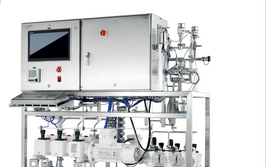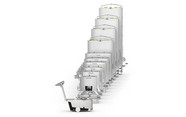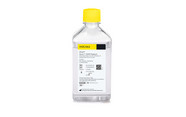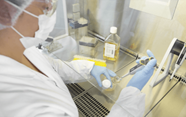
“We Want to Return to the Lab” – How the Russian Invasion Has Disrupted Drug Discovery in Ukraine
When Ed Griffen of MedChemica first made contact with Enamine, it was to collaborate on the Drugs for Neglected Diseases initiative’s COVID Moonshot project. Now, he’s communicating with colleagues in a warzone.

Ed Griffen is part of MedChemica, a seven person company tucked away in the offices of rural Cheshire’s Alderley Park in the UK. After 18 years with AstraZeneca, he and two friends spun their drug discovery company out and have since worked with CROs, Biotechs, and academic organizations of all shapes and sizes. But right now, all of MedChemica’s concern and anxiety is concentrated on one business partner: Enamine. Why? Because Enamine is based in Kyiv.
We spoke with Ed to learn more about the partnership, and how they are responding to the shocking Russian invasion of Ukraine.
Note: Given the rapidly-changing situation in Ukraine, readers should note that this interview was held on March 3 at 9am (GMT).
At this time, a Russian convoy of armored vehicles was stationed dozens of miles from the Ukrainian capital Kyiv, and the Russian military had recently captured a city – Kherson – for the first time during the conflict.
First of all, are your colleagues at Enamine safe?
Prior to the crisis, I would talk to my colleagues at Enamine two or three times a week, and trade emails daily. Much of these communications have halted, but I do remain in limited contact with a few individuals. They haven’t relayed a great deal about what’s going on, but they have told us that they want to return to their labs, and get back to work as soon as they can.
They have also told us how we can help, which is one of the reasons I’m doing this interview. They want us to tell their story, and to contribute directly to supporting the Ukrainian state. They are people who, at the very start of the pandemic, ran towards trouble rather than away from it. I would not be surprised if those behaviors remain consistent.
Some readers may want to help. What can they do?
Meeting unmet medical needs and treating the sick is what we do in drug discovery. To that end in Ukraine, we can make a contribution to one of the multiple humanitarian support groups operating in the UK, Europe, and worldwide. To name just one, I’d direct readers to the International Committee of the Red Cross.
Some people are choosing to make direct contributions to the support of the Ukrainian state, and I completely understand that.
You can also get in touch with your own politicians. You can contact your local representatives and make it clear to them: this is not done in my name.
More broadly, how does the war in Ukraine affect pharma?
Put simply: a great deal of very early stage research is done in Ukraine, particularly in chemistry. This conflict won’t cause delays to the shipment of medicines, but it will disrupt the supply chain of intermediates for people doing discovery work.
On one hand, that disruption will be managed. In the short term, we can cope with it. But in the longer term, it is extremely frustrating – not to mention upsetting.
What I just gave you there is the basic answer. To really answer this question properly, we need to understand the wider historical and industrial context.
Where do Enamine and MedChemica sit in that context?
Thirty years ago, when I started working, drug discovery was almost exclusively within large pharmaceutical companies. In the 1990s, CROs came into being and large pharma began outsourcing some research work. This was also good news for small companies, medium companies, and charities – who could secure contracts to get compounds made and tested. Fundamentally, that is what drug discovery is about: make compounds, test compounds, repeat and improve. In this sense, the wave of globalization that took off in the 1990s really did help to democratize drug discovery.
Enamine fits into that historical process by setting themselves up as a supplier of “building blocks” – essential components of new medicines. Later, Enamine put those blocks together to form a large virtual chemical library. Over the last decade, they established themselves as the world-leading supplier of around a quarter of a million of these building blocks.
To understand the appeal of Enamine’s library, we need to consider its multiplicative potential. If you want to couple two components together, then a library of 1000 compounds means you have 10002 possible combinations – that’s one million; 250,0002 is, to put it mildly, much better.
Enamine also had another (considerably smaller) number on its side: the price. They were charging around US$150 per compound while the going rate from big pharma was $1000. This then opened the door for cash-strapped biotechs, academics, and leaders of initiatives who once sat firmly priced out of the game.
How did Enamine and MedChemica’s collaboration begin, and where does it stand now?
Just as the COVID-19 pandemic kicked off, I attended a conference in the US where I met a contact who told me they were putting together a consortium made of academics and various companies, including a Ukrainian company called Enamine, to work on drug discovery against SARS-CoV-2.
This endeavor was the COVID Moonshot. MedChemica also got involved; we were working to produce a safe and effective direct-to-generic drug that could be used to treat anyone in the world with COVID-19 without the impediments of patent licenses and intellectual property. We’ve worked on the project for two years straight, and the tragedy here is that the week of the Russian invasion was supposed to be our last big new compound synthesis week. We were due to hit one of our key milestones, and nominate our first three candidates for progressing towards human trials.
Our colleagues at Enamine were the backbone of the work that brought us to this point, but it’s now a moment of celebration they cannot share with us – and that feels awful.
What do you think the wider pharmaceutical industry will do in response to the crisis?
I think the industry will switch to other geographical territories for supply. There are very significant CROs in India, China, and even Western Europe who will fill in most of the gap left by Enamine and other Ukrainian players. Much depends on how long the crisis lasts.
Russia annexed Crimea in 2014. In the intervening years, did Enamine brace for escalation?
We had contingency plans, and they had contingency plans. We had already exported all the data and critical compounds that we needed. Enamine had contingency plans for shutdown or extreme difficulty of couriering via air. They also had backup land routes in place. But ultimately, the escalation proved far more dramatic than anticipated. Contingency plans exist to deal with the worst reasonable estimate, but in this case we underestimated.
Do you expect the situation to worsen?
I choose to be hopeful, but regardless I am preparing for it to get worse. If we can return to collaborating with my Enamine colleagues next week, we will be over the moon. If we cannot, then at least we have plans in place. We should bear in mind that COVID-19 hasn’t suddenly gone away because of a crisis in Ukraine. For that reason, we have to persist – as our partners would want us to – in delivering new drugs to treat people who are sick. It’s the same in every other drug hunting endeavor. You have to carry on, no matter what heartbreak you face.
Speaking of which, what is Ukraine’s COVID-19 situation?
It is there. They have had waves of COVID-19 like the rest of us.
In addition, I can say with no controversy that mixing war, invasion, and the large-scale displacement and migration of people during a pandemic will make Ukraine and Eastern Europe’s COVID-19 situation considerably worse.
This isn’t just a recurring theme in human history – it’s one of the rules of human epidemiology. Migrate during a plague, and that plague will get worse. Disrupt and destroy the existing healthcare system, and of course it will grow worse still.
Do MedChemica and Enamine have plans regarding potential end stages of the conflict?
Over the last two years, I’ve found that Enamine is a company of people who work very hard to get the job done. They know what they want to do, and they get on and do it. As soon as we can, we’ll go back to work with them. There may well be impediments to that, but on the COVID Moonshot we’ve faced numerous impediments and we’ve got round all of them so far. All in all, we’re not very process-oriented. We’re goal-oriented.
Globalization has taken numerous hits in the last seven or so years. Are you worried?
Again, I choose to be hopeful. Working across borders is not always straightforward. The COVID Moonshot is a transnational, cross-cultural project. As colleagues, we have our differences and may work in different ways, but we share the same common values and objectives. Much of that is down to the simple fact that we’re trained as scientists. But, beyond that, I believe that there are more commonalities than differences between all people.
The average person cares about their family, their work, and wants to do something meaningful with their life. Certainly, not everybody finds globalization comfortable. Perhaps that’s understandable – it can be abrasive, unfair, and it’s far from a flawless, invulnerable system. But in projects like the COVID Moonshot, I believe we can see the really positive side of globalization in action. I believe it shows we can achieve more through cooperation than isolation. That’s my choice, regardless of how history plays out.
Between studying for my English undergrad and Publishing master's degrees I was out in Shanghai, teaching, learning, and getting extremely lost. Now I'm expanding my mind down a rather different rabbit hole: the pharmaceutical industry. Outside of this job I read mountains of fiction and philosophy, and I must say, it's very hard to tell who's sharper: the literati, or the medicine makers.


















